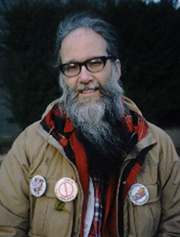GNU project
As the FSF's first full-time paid employee, Tower mostly performed administrative tasks, including managing mailing lists, newsgroups and requests for information. [6] [7] [8]
In 1986, Tower assisted Richard Stallman with Stallman's initial plan to base the C compiler for the GNU Project on the Pastel compiler Stallman had obtained from Lawrence Livermore Lab. [9] Tower worked on rewriting the existing code from Pastel, a variation of Pascal, into C [1] while Stallman worked on building the new C front end. Stallman dropped that plan when he discovered the Livermore compiler required too much memory, concluding, "I would have to write a new compiler from scratch. That new compiler is now known as GCC; none of the Pastel compiler is used in it, but I managed to adapt and use the C front end that I had written." [9] Stallman released his new GNU C compiler March 22, 1987, [10] acknowledging others' contributions, including Tower's, who "wrote parts of the parser, RTL generator, RTL definitions, and of the Vax machine description" based on ideas contributed by Jack Davidson and Christopher Fraser. [2] [11]
Along with Mike Haertel, [12] David Hayes [13] and Stallman, Tower was also one of the initial co-authors of GNU diff, a file comparison utility based on a published algorithm [14] by Eugene Myers. [15] [16] [17]
During the late 1980s and early 1990s, Tower spoke at USENIX conferences as a representative of the FSF. [18]
This page is based on this
Wikipedia article Text is available under the
CC BY-SA 4.0 license; additional terms may apply.
Images, videos and audio are available under their respective licenses.
